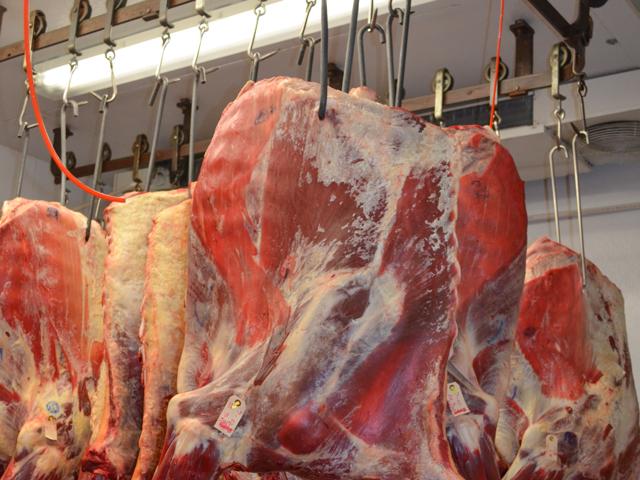US, Japan Reach Beef Agreement
USMEF, NCBA Praise Agreement With Japan on US Beef Exports
WASHINGTON (DTN) -- U.S. Trade Representative Katherine Tai and Agriculture Secretary Tom Vilsack late Wednesday announced that the United States and Japan have reached an agreement to increase the beef safeguard trigger level under the U.S.-Japan Trade Agreement.
The new three-trigger safeguard mechanism will make it less likely that U.S. exports will reach the levels that trigger the safeguard provision that allows Japan to impose higher tariffs.
A senior U.S. official told reporters late Wednesday in a telephone call that the real importance of the agreement is that Japanese importers will not be faced with higher tariffs on U.S. beef.
The senior U.S. official said negotiations had been going on for almost a year, but Tai and Vilsack credited U.S. Ambassador to Japan Rahm Emanuel, who was well known for strong-arm tactics when he was mayor of Chicago, served in Congress and worked in the Obama White House.
"I especially want to thank Ambassador Rahm Emanuel for his fierce determination to get this deal done," Tai said in a news release. "Today's agreement is the latest example of the Biden-Harris administration's successful resolution of trade disputes with our partners that increases market access and economic opportunity for our producers and their workers."
"I want to thank Ambassador Rahm Emanuel, Ambassador Katherine Tai and the entire team at USTR for their work to get this deal across the finish line," Vilsack said.
"This is a win-win for American ranchers and Japanese consumers," Emanuel said. "It ensures certainty for years and shows American beef can compete and win anywhere, anytime."
The agreement includes a new three-trigger mechanism whereby all three triggers must be hit for Japan to implement the safeguard and impose a higher tariff. The three triggers are:
P[L1] D[0x0] M[300x250] OOP[F] ADUNIT[] T[]
-- Imports from the United States must exceed the original beef safeguard trigger level under the U.S.-Japan Trade Agreement.
-- The aggregate volume of beef imports from the United States and the original signatories of the Comprehensive and Progressive Agreement for Trans-Pacific Partnership (CPTPP) must exceed the CPTPP beef safeguard.
-- Imports from the United States must exceed the total amount of beef imports from the United States during the previous year.
The U.S. beef industry has complained that since the CPTPP went into effect, other beef-producing countries, particularly Australia, have had an advantage over the United States in access to Japan.
The U.S. official said the date on which the agreement will go into effect is not certain because the text must be published, and the Japanese Diet must approve it.
"The United States, in consultation with Japan, will publish the final text of the agreement at the soonest, appropriate time," USTR said in its release.
Under the current arrangement, if U.S. beef imports to Japan reach a certain level, the Japanese tariff on U.S. beef, which is 25%, would rise. In 2021, the tariff went up to 38.5% for 30 days, then back down to the normal 25%, where it remains, the U.S. official said.
In 2021, the United States was the top beef-exporting country in the world, with global sales of beef and beef products valued at over $10 billion, USTR noted. Exports of U.S. beef to Japan totaled almost $2.4 billion in 2021.
USMEF, NCBA PRAISE AGREEMENT
The U.S. Meat Export Federation and the National Cattlemen's Beef Association on Thursday praised the announcement from the Office of the U.S. Trade Representative that U.S. negotiators reached an agreement with Japan to ease U.S. beef exports to Japan.
USMEF President and CEO Dan Halstrom said, "USMEF greatly appreciates the efforts of USTR and USDA to adjust Japan's safeguard on U.S. beef.
"The U.S.-Japan Trade Agreement was a tremendous breakthrough for the U.S. meat industry, including the significant reduction in Japan's tariffs on U.S. beef, but the playing field has not been entirely level due to this safeguard. The changes announced today reduce the potential impact of the safeguard and make it less disruptive for U.S. exporters and their customers in Japan."
USMEF noted that U.S. beef exports to Japan exceeded 320,000 metric tons (mt) in 2021 and set a new value record at $2.38 billion. But U.S. beef was subject to a higher tariff than its competitors for 30 days, from mid-March to mid-April, after imports exceeded the safeguard volume.
NCBA Senior Director of International Trade and Market Access Kent Bacus said: "While the details of the agreement in principle have not been disclosed, NCBA is encouraged that today's announcement means we are taking necessary steps to secure long-term solutions that enable American cattle producers to continue providing Japanese consumers with high-quality U.S. beef at competitive prices."
"NCBA greatly appreciates Ambassador Tai's leadership and the hard work of negotiators who have been working on this effort for the past year."
Jerry Hagstrom can be reached at jhagstrom@nationaljournal.com
Follow him on Twitter @hagstromreport
(c) Copyright 2022 DTN, LLC. All rights reserved.






